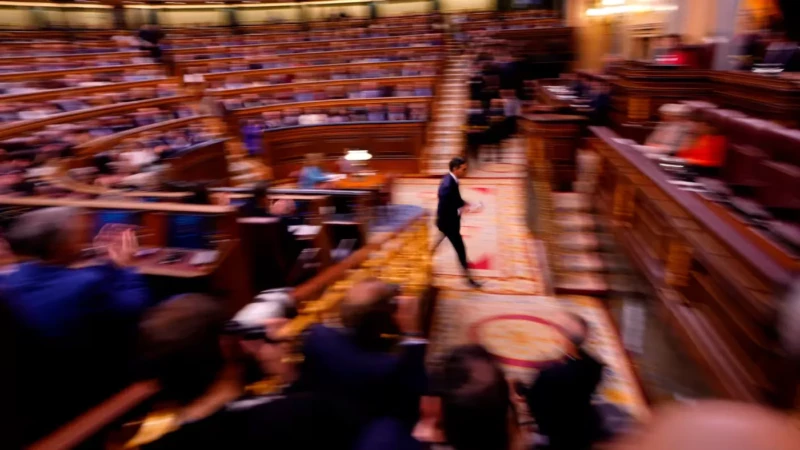Manuel Sanchis i Marco
The author is a former European Commission economist and a member of Foro España Cívica, a non-partisan organisation that promotes political engagement

Since 1995, a stagnation in productivity and drop in the national savings ratio have forced Spain to grow by issuing public debt. Yet we must be doing something wrong when the debt/GDP ratio has gone from 35.7% in 2007 to 110% in 2023. Added to this lack of control of public finances are the pacts the Socialist Party has reached with the Catalonian separatist parties ERC and Junts, which enabled president Sánchez’ investiture in exchange for an amnesty bill. Article 2.c of this bill, introduced for debate before Spain’s Parliament, covers acts of terrorism that have not been tried and convicted and may run afoul of the EU’s laws for terrorism and associated capital movements and payments (art. 75, TFEU).
The Socialist Party’s pact with Junts, foreseeing the direct participation of Catalonia in EU institutions, is baffling because the interlocutors of the EU are States, not regions. The pact, further, promotes the return to Catalonia of the companies that abandoned the region because of the unilateral declaration of independence of 2017. How the companies will be attracted remains unclear, but using subsidies (financed with the savings on the interest of condoned debt, some 1.3 billion euros that will be paid by the rest of Spain) will cause distortions in competition and dysfunction in the single market.
The pact bi-laterally modifies the system that finances Spain’s autonomous communities and includes a clause to facilitate the exceptional handover of 100% of taxes paid in Catalonia. This resembles a Basque fiscal framework for Catalonia, with the aggravating circumstance that it makes no mention of what Catalonia will pay for the services the State provides gratia et amore dei. The pact fractures the basic principle of a single State treasury. And, even more concerning, it slams the door on the State’s fight against fiscal fraud in Catalonia. This is a serious violation of national sovereignty and undermines efficiency in tax collection and supervision in Spain and the EU.
The Socialist Party’s pact with ERC, in turn, establishes that public investment in Catalonia will be constant and proportional to the region’s weight in the national economy. Real heroism will be needed to square this with the EU’s regional policies, which invest structural funds to promote cohesion in the less prosperous regions. This pact, further, outlines that pertinent legislation will be passed to cover the State budget and the use of EU recovery funds. Does this insinuate that some of the next generation funds will be earmarked implicitly for the Catalonian market? Moreover, according to official figures, the public sector, principally municipal governments and public enterprises, receives 61% of these EU funds. When private companies receive funds, they must pay taxes on them and, thus, contribute to tax revenues to finance current expenditure. This contravenes the law: “Support from the Facility shall not, unless in duly justified cases, substitute recurring national budgetary expenditure” (art. 5, Regulation (EU) 2021/241).
A further agreement with ERC is for the State to condone 20% of Catalonia’s debt – 15 billion euros – a gesture that will be extended to the country’s other autonomous communities. Although the autonomous communities’ income is excessively cycle-dependent, and the condonation of the debt will be insufficient to allow them back into the markets, this agreement with ERC is a real time-bomb which will splinter the system that finances Spain’s autonomous communities.
Condoning the sub-sovereign debt of autonomous communities that have not been fiscally responsible will introduce moral hazard and create veritable incentives to default on future debt. The debt that the State takes on will ultimately be paid by the rest of Spain. The same will happen with interest payments: the regions that have managed their finances the worst will not have to pay, while the bill will be picked up by the rest of the country, and inevitably those regions with the lowest debt. And right when the State’s fiscal collection capacity has been slashed by 20%.
As markets perceive the State’s determination to partially condone the debt of other autonomous communities, their ratings will improve in the short term. This will be fleeting, however: The decline in the central government’s capacity for tax collection, and the interests the autonomous communities with the greatest debt will discharge onto the shoulders of the most virtuous vaticinate a worsening in Spain’s credit ratings that will drag down the autonomous communities’ as well. The tab, again, will fall to the rest of Spain. Unless, together with 100% of tax-generated income, Spain also transfers to Catalonia 100% of the region’s expenses and all the services they entail. The pact is silent on this subject.
If the objective of any amnesty is to create a new political consensus to facilitate dialogue and harmony across the land, these pacts with the Catalonian separatists provide the best praise injustice ever paid equity.
https://www.ft.com/content/1251812a-761d-48b8-b0c9-936eec65959c
https://www.almendron.com/tribuna/amnesty-for-separatists-threatens-spains-rule-of-law/